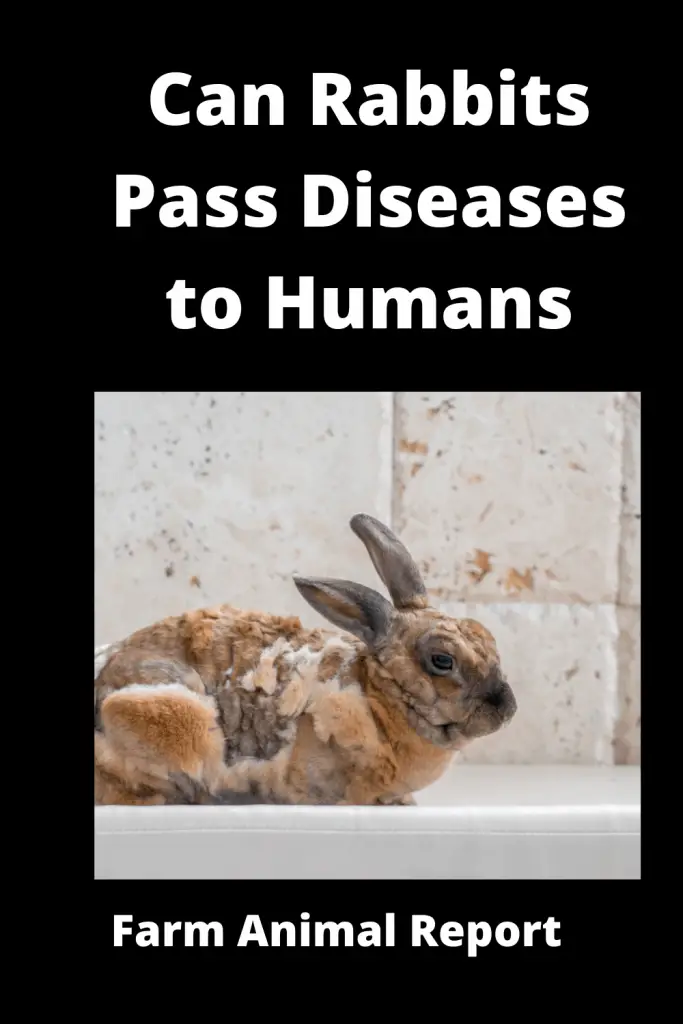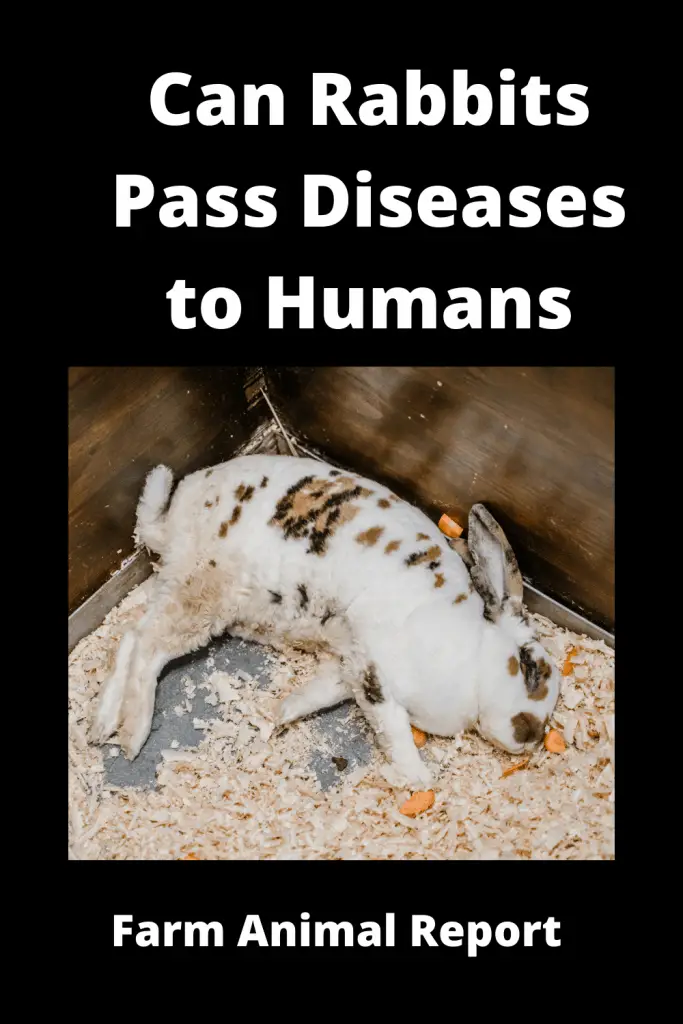As a general rule Rabbits can pass Diseases to Humans. Some of the items that can be passed are parasites. 1) Pasteurellosis 2) Ringworm 3) Mycobacteriosis 4) Crptosporidiosis It is extremely important that you have your bunny checked by a Vet. Rabbits are extremely huggable best to be preventative.
Family of Rabbit Diseases Can be Passed to humans – They are called Zoonosis Diseases – These can be passed to Humans – Find the Symptoms below
- Pasteurellosis
- Ringworm
- Mycobacteriosis
- Cryptosporidiosis and external parasites
Can Rabbits pass Diseases to Humans / Turning Point
Before we get into the main discussion, it’d be ideal to let you know the turning point between rabbit diseases that are communicable and those that are non-communicable to humans.
Now, any rabbit disease that is not categorized as zoonosis related, that is, those types of rabbit diseases caused by virus and bacteria, the rest cannot be transferred to humans, even though they come in contact with the sick rabbit. So, zoonosis related diseases in the rabbit are the ones that are communicable, which is why we will be discussing it today.
You can also Read our Guide –18 Ways to Make Money by Rabbit Farming—Extensive Guidelines for Rabbit Farmers
Zoonosis Linked with Rabbits
When it comes to illness in animals, we all need to understand that they won’t reduce in size or weight, even when they are sick, especially the rabbits. In other words, except you’re a vet, it’s hard to tell a sick rabbit from a healthy one.
Nevertheless, even though it doesn’t affect their health, if such diseases come in contact with a human, it can lead to life-threatening illnesses. That’s why, people that have a medical history of chronic illness, immunodeficiency and pregnancy may be at higher risk of developing disease or complications from the zoonotic disease.
So, whether you’re sure if a rabbit is sick or not, when you come in contact with them or things they touched, immediately consult with your physician before going to work with them again.
Rabbits Zoonotic Diseases and How They Are Transferred to People
Most times, rabbits that are housed outdoors, taken forcefully from wild populations, or those that are sometimes bought from a pet store may be infected with zoonotic diseases. And the zoonotic diseases that are mostly linked with rabbits often include;
- Pasteurellosis
- Ringworm
- Mycobacteriosis
- Cryptosporidiosis and external parasites.
Pasteurellosis in Rabbits
One of the most common ways rabbits can transmit bacteria from themselves to a human is either through bites or scratches. And one of the well-known agents, that is often responsible for this transfer is known as Pasteurella multocida, a bacterium that lives in the oral cavity and the upper respiratory tract of rabbits.
Symptoms of Pasteurellosis
- Following a soft tissue Infection – an animal Bite or Scratch
- Pain
- Tenderness swelling
- Fever
Symptoms of Ringworm in Rabbits
- Scaly Skin in Appearance of a Circle
- Crusted Rash – Circular
- Patches of Hair Loss
- Itching
- Blister Like Lesions
- Fungal Infection – not a parasite
- Include Athletes foot
- Jock rash
- Is Contagious
Biologically known as “Dermatophytosis”, is a fungal skin infection that most people often call “ringworm”, which happens to both humans and animals. This disease is often symbolized by a scaly round area of hair loss. And it is only being transferred by direct skin-to-skin contact with an infected rabbit.
Also, Cheyletiella parasitovorax and other associated species are non-burrowing skin mites of rabbits, which can be transferred from rabbits to people, just by handling and touching these infested animals that cause transient dermatitis.
Other than that, ringworm can be transferred from a rabbit to a human through possible external parasites like fleas, ticks, and lice, when they land on our skin, after making close contact with an infected rabbit.
Symptoms of Cryptosporidiosis in Rabbits
- Appear about 1 Week after Infection
- Watery Diarrhea
- Dehydration
- Loss of Appetite
- Weight Loss
- Stomach cramps
- Fever
- Nausea
- Vomiting
This is an intestinal protozoal infection that is often acquired when we come in contact with an accidental ingested fecal material from an infected animal. And even though you can detect this disease in a rabbit, as soon as they start having diarrhea, other animals may not show any symptoms of it, thus making it hard to detect. Generally, any animal with diarrhea should be considered to have a zoonotic disease
Symptoms of Mycobacteriosis in Bunnies
- Fever
- Weight Loss
- Cough
- Night Sweats
- Blood in Stool
- Loss of Energy
- Shortness of Breath
Pygmy rabbits (Brachylagus idahoensis) may be infected with the Mycobacterium avium complex (MAC). And the transfer of this MAC to humans mainly takes place through aerosolization and inhalation of the agent in contaminated soil. In terms of the aftermath effect, people infected with MAC may start developing lymphadenitis & pulmonary disease, which can be likened to tuberculosis or even more severe spreading diseases.
Immune-deficient persons are highly susceptible to spread MAC infection and that’s why they will always need to consult their personal doctor before thinking of working with rabbits again.
Other potential zoonotic diseases of wild rabbits that have not been identified in the pygmy rabbit are tularaemia, plague, salmonellosis, and campylobacterosis. And people with high exposure to animals and animal environments may likely develop serious allergic reactions to animal proteins (allergens).

How Rabbit Diseases are Passed to Humans
The transfer of zoonotic diseases from animals like a rabbit down to humans is mainly through direct contact, indirect contact with insect vectors, and contaminated inanimate objects touched by the infected rabbit or inhalation of aerosolized materials. Nevertheless, we can guard ourselves against a lot of these diseases by just following the below basic hygiene guidelines:
- While you’re handling or playing with an animal inside the animal’s house, avoid eating, drinking, applying makeup or using any tobacco products at that moment. It is very lethal to do these things while around animals like rabbits.
- Ensure that you thoroughly wash off any bite, scratch wounds and immediately report injuries to your physicians.
- If you’re about going to check or handle rabbits, always ensure that you’re wearing your gloves. You really need to do this especially when you come in contact with a sick rabbit’s, body fluids, tissues, and waste. And as stated earlier, if you mistakenly get in contact with them, wash the hands-off immediately, using a sanitizer.
- The air you breathe when around animals may not be that safe for your health so, when you’re about going into an animal’s house, always ensure that you wear respiratory protection always.
- Other than the airborne diseases you can contact in a rabbit’s house, always protect your skin by wearing dedicated protective clothing like a lab coat or coveralls when handling them. And when you’re about washing those clothes, launder them separately from the rest of your normal clothes.
- Once you discover that a rabbit is sick, report immediately to a vet doctor in order to receive prompt treatment.
- Always make sure that the rabbit’s house is kept clean and disinfected at all times.
In a nutshell, rabbit diseases can only be passed to a human if it is a zoonotic disease.







